WINDSCREEN WASH, WIPE
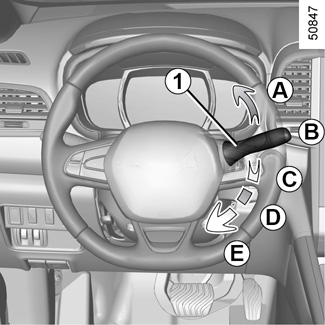
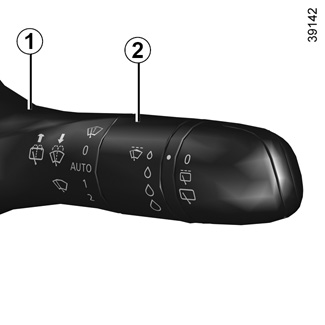
Vehicle fitted with intermittent windscreen wipers
A single sweep
A short push will trigger one sweep of the wipers.
B stop
C intermittent wiping
The wipers will pause for several seconds between sweeps. It is possible to change the time between sweeps by turning ring 2.
D slow continuous wiping
E fast continuous wiping
Special note
When driving the vehicle, the wiping speed slows down whenever the vehicle stops. For example, fast wiping speed will slow to normal wiping speed. As soon as the vehicle moves off, wiping will return to the speed originally selected.
If stalk 1 is operated, it overrides and cancels the automatic function.
Positions A, C and D are accessible with the ignition on. Position E is accessible only when the engine is running.
Efficiency of a wiper blade
Check the condition of the wiper blades. How long they last depends on you:
- it must remain clean: clean the blades and the screen regularly with soapy water;
- do not use it when the screen is dry;
- free it from the screen when it has not been used for a long time.
In any event, replace them as soon as they begin to lose efficiency: approximately every year (refer to the information on “Wiper blades: replacemnet” in section 5).
Precautions for using the wipers
- In freezig or snowy weather, clear the screen before starting the wipers (risk of motor overheating);
- ensure that no objects are obstructing the travel of the blade.
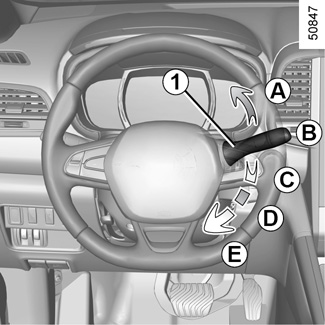
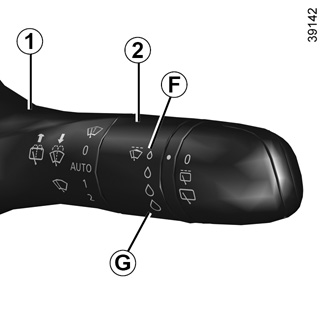
Vehicle fitted with front windscreen wiper rain sensor
The rain sensor is located on the windscreen, in front of the interior rear-view mirror.
A single sweep
A short push will trigger one sweep of the wipers.
B stop
C automatic wiper function
When this position is selected, the system detects water on the windscreen and triggers the wipers at a suitable wiping speed. It is possible to change the triggering threshold and the time sweeps by turning ring 2:
- F : minimum sensitivity
- G : maximum sensitivity
The higher the sensitivity, the quicker the wipers will react and the faster the wipe.
When activating automatic wiping or when increasing sensitivity, one sweep of the blades is performed.
Note:
- the rain sensor is only intended as a driving aid. In the event of reduced visibility, the driver should manually activate the wipers;
- In foggy weather or during snowfalls, wiping is not automatically triggered and remains under the driver’s control;
- in the event of temperatures below zero, automatic wiping is not activated when the vehicle is started. It is automatically activated as soon as the vehicle exceeds a certain speed (approximately 5 mph (8 km/h));
- do not activate automatic wiping in dry weather;
- fully de-ice the windscreen before activating automatic wiping.
Operating fault
In the event of a malfunction of the automatic wiping, the wiper is set to intermittent wiping. Contact an authorised dealer.
The operation of the rain sensor can be disturbed in the event of:
- damaged wiper blades; a screen of water or traces left by a blade in the sensor’s detection zone may increase the response time of the automatic wiper, or increase the wiping frequency;
- a windscreen with any chip or crack level with the sensor, or a windscreen covered in dust, dirt, insects, ice, the use of washing wax and water-repellent chemicals; the automatic wiping will be less sensitive, or even unresponsive.
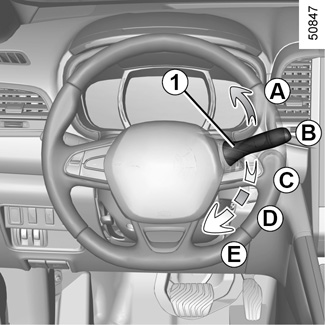
D slow continuous wiping
E fast continuous wiping
Special note
When driving the vehicle, the wiping speed slows down whenever the vehicle stops. For example, fast wiping speed will slow to normal wiping speed. As soon as the vehicle moves off, wiping will return to the speed originally selected.
If stalk 1 is operated, it overrides and cancels the automatic function.
Precautions
- In the event of ice, check whether the blades are stuck to the windscreen before operating the wiping mechanism. If you activate the wipers while the blades are stuck down with ice, you may risk damaging both the blade and the wiper motor.
- Do not activate the wipers on a dry screen. This will lead to the premature wear or damage to the blades.
Positions A and D are accessible with the ignition on. Positions C and E are accessible only with the engine running.
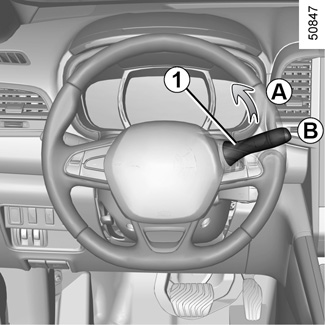
Specific front wiper position (service position)
This position enables the blades to be lifted to remove them from the windscreen.
It may be useful to:
- to clean the blades;
- to release the blades from the windscreen in winter;
- replace the blades (please refer to the information on “Wiper blades” in Section 5).
With the ignition on and the engine off, lower the windscreen wiper stalk fully (fast continuous wipe position). The wiper arms stop in a position away from the bonnet.
To return the blades to position, make sure they have been placed on the windscreen, then move the stalk to position B (stop) with the ignition on.
Before switching on the ignition, place the wipers on the windscreen. Otherwise, there may a risk of damage to the bonnet or the wipers when they are switched on.
Note:
Once the wipers have been switched off, at least 1 minute after locking the vehicle, it is possible to manually move the blades. Do not force the blade arms to move. This may risk damage to the wiper motor, the arms and the blades.
After your intervention, to reposition the blades correctly, make sure the blades are resting on the windscreen, switch on the ignition and activate the wiper control.
The blade on the driver’s side must always be above the passenger-side blade. If this is not the case, a quick sweep of the windscreen wipers should be performed once the vehicle is travelling at over 4 mph (7 km/h).
Before any action involving the windscreen (washing the vehicle, de-icing, cleaning the windscreen, etc.) return stalk 1 to position B (stop).
Risk of injury and/or damage.
In the event of obstacles present on the windscreen (dirt, snow, ice, etc.), clean the windscreen (including the central area located behind the interior rear-view mirror) and the rear screen before starting the wipers (risk of motor overheating).
If an object is preventing a blade from moving, it may stop functioning. Remove the obstacle and reactivate the wiper using the wiper stalk.
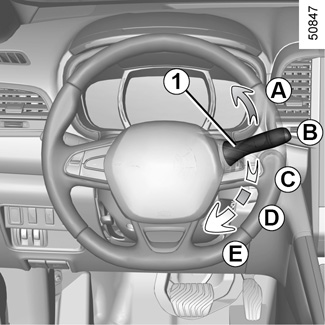
Windscreen washer
With the ignition on, pull stalk 1 then release.
A brief pull will trigger a single sweep of the wipers, in addition to the windscreen washer.
A longer pull will trigger three sweeps of the wipers followed, a few seconds later, by a fourth, in addition to the windscreen washer.
Note:
In temperatures below zero, the washer liquid risks freezing to the windscreen, thereby reducing visibility. Heat the windscreen using the demister control before cleaning.
Headlight washers
Headlights on
On equipped vehicles, hold stalk 1 pulled towards you for about 2 seconds - the headlight washers and windscreen washers will be activated at the same time.
The headlight washers are also activated after three prolonged movements on the front windscreen washer control.
Note:
To ensure the headlight washers operate correctly in winter, remove snow from the jet trims and de-ice the jet trims using an aerosol de-icer.
You are recommended to regularly remove dirt encrusted on the headlight glass.
When the minimum windscreen washer fluid level is reached, the headlight washer system may be deprimed.
Fill the windscreen washer fluid and then activate the windscreen washer, with the engine running, to reprime the system.
When working in the engine compartment, ensure that the windscreen wiper stalk is in position B (stop).
Risk of injury.